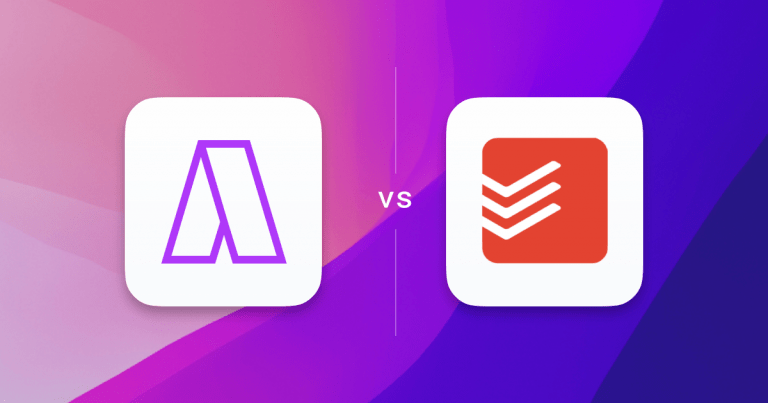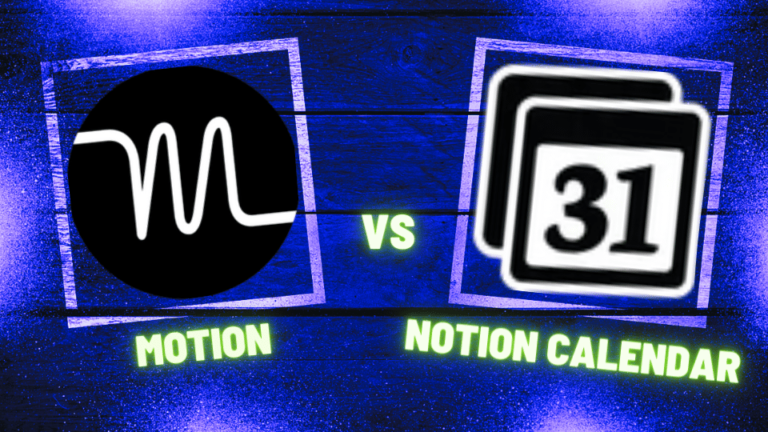What is Motion
Motion is a productivity tool that stands out for its innovative approach to task and time management. It’s designed to help users not just organize their tasks but also optimize their schedules in real time. Motion employs artificial intelligence to automatically plan your day, taking into account your tasks, meetings, and even preferred working hours. This level of automation and personalization sets Motion apart from traditional task managers. It’s particularly effective for professionals and teams who deal with dynamic schedules and seek to maximize their productivity without the overhead of manual planning.

Key Features of Motion
- Auto-Scheduling with AI: Motion uses AI to automatically reorganize and prioritize tasks based on various parameters such as deadlines, duration, and importance, providing an experience akin to having a personal assistant.
- Project Management Capabilities: While not as extensive as dedicated project management tools, Motion offers effective task organization in a planner-like style. It features Kanban layouts, status, workspace, label, and project categorization.
- Meeting Scheduler with AI: Motion includes a feature for booking meetings, which can be linked externally. This function allows for one-time or recurring booking links, with customizable preferences such as importance, duration, and buffer time.
- Comprehensive Task Management: The app integrates tasks, projects, notes, and team management in one place, with AI assisting in the optimal scheduling and organization of these elements.
- Enhanced Calendar Management: Motion’s calendar function is enriched with AI, which automatically rearranges events and meetings to optimize the user’s schedule.
- AI-Powered Workflow Customization: The AI within Motion continuously learns from the user’s behavior and preferences to adapt and optimize task scheduling and management.
What is Notion Calendar
The Notion Calendar, previously known as Cron Calendar, is a calendar application designed for managing meetings and events. It integrates closely with Notion documents, allowing users to connect their Google calendars, schedule meetings, manage events, and collaborate on upcoming events. It supports video conferencing links for platforms like Zoom and Google Meet, offers color coding for time blocking, and has deep integrations with Notion databases.
Key Features of Notion Calendar
- Google Calendar Integration: This feature allows users to seamlessly connect their Google Calendar with Notion, enabling efficient management of events and meetings within a unified interface. It simplifies scheduling and updating events across platforms.
- Meeting Booking Functionality: Notion Calendar offers a user-friendly interface for scheduling meetings. This includes options for setting up recurring meetings, sending invitations, and managing RSVPs, streamlining the meeting planning process.
- Notion Page Connectivity: Users can link calendar events to specific Notion pages, facilitating better organization and access to related notes, tasks, or documents associated with an event. This integration enhances productivity and project management.
- Video Conferencing Integration: The calendar supports adding video conferencing links from popular platforms like Zoom and Google Meet directly into event details. This feature is particularly useful for remote teams and virtual meetings, offering convenience and efficiency.
- Color Coding and Time Blocking: Notion Calendar allows users to color code their events for better visual organization. The time blocking feature helps in allocating specific time slots for tasks, aiding in time management and daily planning.
- Cross-Platform Availability: It is accessible on various platforms including iOS, Windows, Mac, and the web. This cross-platform availability ensures users can manage their calendars and stay organized regardless of the device they are using.
Motion vs Notion Calendar: Features
| Features | Motion | Notion Calendar |
|---|---|---|
| Integrations | Google Calendar, Zoom, Zapier, and Microsoft Teams, Gmail,Outlook | Notion, Zoom, Google Calendar |
| Calendar | Features an intelligent calendar that integrates with existing calendars | Yes |
| Platforms | Available on multiple platforms, including mobile and desktop | macOS, iOS, Android, Web, Windows |
| Task Management | Includes AI-driven task prioritization and dynamic scheduling adjustments | No |
| Natural Language Processing | Yes | No |
| Time Blocking | Available | Yes |
| Analytics | No | No |
| Meeting Scheduler | Yes | Yes |
| Time Zones | Yes | Yes |
| Reminders | Yes | Yes |
| Customer Support | Average | Average |
| 1:1 User Onboarding | No | Yes |
| Pricing | $19 per month, annually | Free |
Motion vs Notion Calendar: Pricing
Motion Pricing
Motion offers two pricing plans:
(i) Individual Plan: $14 per month when billed annually, or $34 billed monthly
(ii) Team Plan: $12 per user per month when billed annually, or $20 billed monthly
Notion Calendar Pricing
Notion Calendar is free to use for Notion users
Motion vs Notion Calendar: Reviews
Motion Review
Motion is a comprehensive task management tool with AI-driven scheduling features. It excels in automating and prioritizing tasks, but it might not be ideal for those who prefer less manual task input, as it requires detailed information for effective task prioritization. While it offers project management capabilities, these may not be sufficient for larger teams or those needing a wide range of view options. The interface can be complex due to its numerous features, and its price point is also higher compared to some competitors, which could be a consideration for users with budget constraints.
Notion Calendar Review
The Notion Calendar, previously known as Cron Calendar, is appreciated for its seamless integration with Google Calendar and its ability to manage events alongside Notion project timelines. It’s praised for its intuitive scheduling features, support for different time zones, and a modern, clean design. However, some users might find limitations in advanced features like detailed task analytics or the lack of more diverse integrations beyond Google services. It’s suitable for both personal and professional use but might require additional tools for more complex task management needs.
Which One Should You Pick
Consider Motion if
- You’re Interested in AI-Assisted Scheduling: Motion’s AI auto-scheduling can be helpful, but it might be overwhelming for those new to such technology or who prefer more control.
- You Need Basic Project Management Tools: While Motion offers some project management capabilities, it may not be comprehensive enough for complex project needs.
- You Want Integrated Meeting Scheduling: Its meeting scheduling feature is convenient, but might not offer the flexibility of dedicated scheduling tools.
Consider Notion Calendar if
- You Value Google Calendar Integration: If syncing with Google Calendar is central to your workflow, Notion Calendar’s integration can streamline your scheduling process, although it may lack variety in other third-party integrations.
- You Utilize Notion for Project Management: The calendar is beneficial for those already using Notion for project management, but it might not offer the depth required for more complex task management outside the Notion ecosystem.
- You Prefer a Clean, Minimalist Design: Its straightforward and clean design is ideal for users seeking simplicity, but it may not satisfy those needing more intricate or customizable scheduling features.
Best Motion and Notion Calendar Alternatives
- Akiflow: Akiflow is a time management app offering time blocking, task scheduling, and integrations with various tools. It focuses on productivity and organization through a unified task and appointment interface.
Akiflow Price: $19 per month, paid annually - Reclaim: Reclaim.ai is a smart calendar assistant that automates scheduling for work and personal life. It intelligently blocks time for tasks, meetings, and personal events, ensuring a balanced schedule. The app syncs with existing calendars making it ideal for professionals looking to optimize their time.
Reclaim Price: $8 per month, paid annually - Sunsama: Sunsama is a daily planner that helps professionals stay focused & productive by combining tasks, calendars, & emails. It offers features like guided planning, timeboxing, & automatic syncing.
Sunsama Price: $16 per month, annually.

Best Time Blocking Web and Desktop Apps, 2024
Explore the best time blocking apps of 2024! Discover how Akiflow, TickTick, Usemotion, Sunsama, Sortedapp, and TimeHero revolutionize productivity, offering unique features for professionals and students to manage tasks and enhance efficiency.

Improve Focus: 5 ADHD Productivity Tools & Calendar Apps for 2023
Discover five of the best apps and tools for those with ADHD, from note-taking apps to time-blocking platforms. Get ready to stay organised, motivated and on track with Akiflow’s essential guide.

The Top 3 Todoist Alternatives (In-Depth Review)
Over 25 million people now use Todoist to stay on track and plan their day. It has expanded rapidly and is now a widely used task manager with seamless integrations into other task and calendar managers like Akiflow. While Todoist is hugely popular among its wide user base, there are now a variety of Todoist […]

